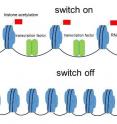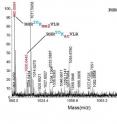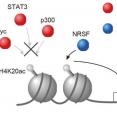The discovery of a totally new kind of 'mark' in human cell nucleus
A Japanese research group verified the presence of a protein modification that is a unique mark in human cell nucleus. This protein modification, Histone H4 lysine 20 acetylation (H4K20ac), was only discovered in plant cells and its existence in mammalian cells has been indirectly proven. Their study suggests that H4K20ac is associated with gene repression. This new discovery of H4K20ac may lead to further clarification of the mechanisms in disease progression. In recent years, it has been known that epigenetic factors, factors outside of the genetic sequence, are deeply involved in the development of various diseases. Histone, a component of chromatin consisting of DNA, receives post-translational modification for changing the function of protein as an epigenetic factor. It was accepted that histone acetylation modifications are implicated only in gene activation,"switch on" (Fig. 1).
A research group was led by Yoshitaka Isaka, professor, and Shiro Takahara, endowed chair professor, and Junya Kaimori, endowed chair professor at the Graduate School of Medicine together with Toshifumi Takao, professor at the Institute for Protein Research, Osaka University, Hiroshi Kimura, professor at the Graduate School of Bioscience and Biotechnology, Tokyo Institute of Technology, and Professor Yasuyuki Okawa, professor at Medical Institute of Bioregulation, Kyushu University.
This group made antibodies against H4K20ac. Although known acetyliation was enriched around promoters of highly expressed genes, this group, by using a chromatin immunoprecipitation method, next-generation sequencing, and supercomputers, found that H4K20ac, a new type of histone modification, was enriched around promoters of minimally expressed genes (Fig. 2 and Fig. 3.).
It is expected that the mechanism of development of various diseases such as metabolic disorders including diabetes, cardiovascular diseases including cardiomegaly, kidney disorders, and cancer will be elucidated by using H4K20ac, a new type of histone modification discovered by this group.
This research was featured in the electronic version of Scientific Reports on Monday, April 11, 2016.
Source: Osaka University
Other sources
- Totally new kind of 'mark' discovered in human cell nucleusfrom Science DailyFri, 1 Jul 2016, 17:31:06 UTC
- The discovery of a totally new kind of ‘mark’ in human cell nucleusfrom Science BlogFri, 1 Jul 2016, 16:21:35 UTC
- The discovery of a totally new kind of 'mark' in human cell nucleusfrom PhysorgFri, 1 Jul 2016, 12:51:18 UTC


